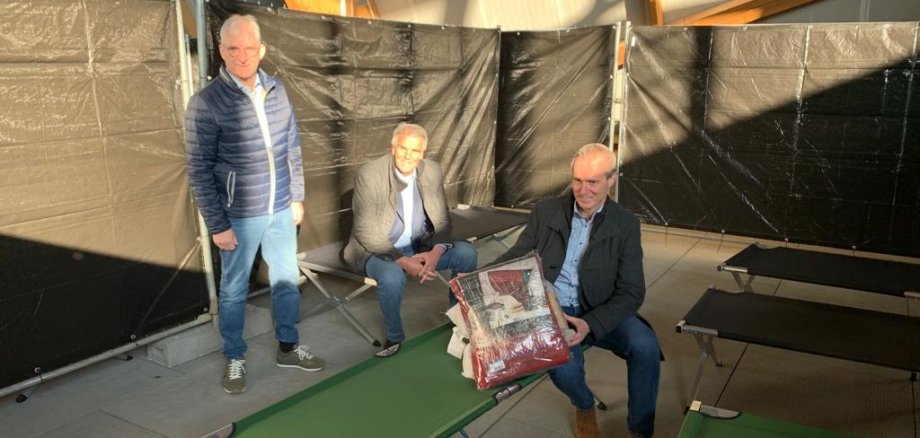Shared accommodation in Allendorf ready for the arrival of refugees
After four weeks of war and destruction in Ukraine, 3.5 million people are said to have left the country to seek shelter outside the contested areas, according to official figures. The countries of the EU have agreed to take in and care for refugees. This includes the Federal Republic of Germany. In a first wave, mainly refugees came who had family or friendship ties to the West and thus had fixed destinations. In the meantime, the initial reception centres of the Länder have stepped in and are regulating the distribution to the municipalities.
The district of Waldeck-Frankenberg has prepared two collective accommodation centres. The multi-purpose hall in Allendorf (Eder) and the Nordhessenhalle in Volkmarsen. If necessary, further capacities can also be activated at short notice. During an on-site visit, District Administrator Jürgen van der Horst, First District Councillor Karl-Friedrich Frese and Mayor Klaus Junghenn were convinced of the operational readiness of the facility in Allendorf. Up to 300 people can be accommodated in the multi-purpose hall, 116 are to move in soon.
District Administrator van der Horst and First District Councillor Karl Frese thanked all those who contribute to enabling the district to fulfil its humanitarian task. In particular, the municipality of Allendorf, whose Bauhhof was instrumental in setting up the infrastructure in the hall and which will also provide administrative assistance in registering the arriving people. The district administrator also thanked the Frankenberg district association of the German Red Cross, which will operate the facility and ensure that all arriving people can recover from the hardships of flight. "The lead responsibility lies with our specialist service for rescue services, fire protection and disaster control," said EKB Karl Frese. "In 2015, they already helped to cope with the onslaught of refugees at that time and to coordinate the offers of help". He can therefore draw on corresponding experience.
"We currently have 1120 refugees in the district, but they have already been accommodated," the district administrator explained. "In the future, we expect another 1,000 people to be assigned, but that ultimately depends on the duration and the course of the war in Ukraine. It is expected that the people will stay in the collective accommodation for a relatively short period of time, since, among other things, numerous flats have been made available via the registration platform set up by the district on its website. The arriving people also have the opportunity to take up work immediately after registration and determination of their vaccination status.
Allendorf's mayor Klaus Junghenn emphasised that the acceptance for the facility in the community is very high, as is the people's willingness to help. "Everyone wants to contribute somehow to alleviating the hardship and suffering of the refugees," Kuhnhenn said. "Nevertheless, I ask that no donations in kind be brought to the facility, it is not prepared for that." First of all, they will get an overview of the actual needs and which aids are most urgently needed and then ask for them specifically.
